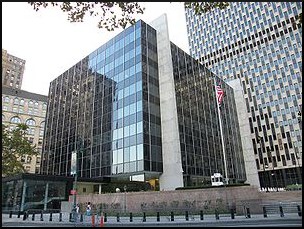
Trade correspondent L.C. reports:
President Trump’s 25% tariff on steel has now become a constitutional issue likely to end up at the Supreme Court. On March 25th the US Court of International Trade (CIT) in New York ruled against a steel users’ group, the American Institute for International Steel (AIIS), which argues that Section 232 of the Trade Expansion Act of 1962 is unconstitutional.
The case is not over, however. The AIIS confirmed that it will appeal, and the appeal is likely to go directly to the Supreme Court. The constitutional issue at stake – impermissible delegation of lawmaking to the executive branch (the non-delegation doctrine) – is now being litigated in a growing number of cases unrelated to trade.
The three CIT judges stated that they ruled as they did in part because they had to follow the precedent of a 1976 Supreme Court case addressing Section 232 – Federal Energy Administration v. Algonquin SNG Inc.
The CIT panel judges indicated some sympathy for the AIIS’s case. One of the judges, Judge Gary Katzmann, released a separate dubitante decision (expressing dissent while going along with the majority opinion). His decision recognized the relevance of the precedent but declared,
My colleagues, relying largely on a 1976 Supreme Court decision, conclude that the statue passes constitutional muster. While acknowledging the binding force of that [Algonquin] decision, with the benefit of the fulness of time and the clarifying understanding borne of recent actions [e.g., by the President], I have grave doubts…. We deal now with real recent actions, not hypothetical ones…. If the delegation permitted by Section 232 as now revealed does not constitute excessive delegation in violation of the constitution, what would?
Some analysts suggest that this argument will get a sympathetic hearing especially from Supreme Court Justice Neil Gorsuch, new to the court this year, who has written against congressional delegation of authority in the past.
Even the three-judge opinion was wary of Section 232, saying that provisions of the statute “bestow flexibility on the President and seem to invite the President to regulate commerce by way of means reserved for Congress, leaving very few tools beyond his reach.” Hence “one might argue that the statute allows for a gray area where the President could invoke the statute to act in a manner constitutionally reserved for Congress but not objectively outside the President’s authority, and the scope of review would preclude the uncovering of such a truth.” Nonetheless, the judges concluded, “such concerns are beyond this court’s power to address, given the Supreme Court’s decision in Algonquin.”
It is likely the White House will ignore the court’s caveats and feel even less constrained as it moves to invoke Section 232 in other situations, such as auto tariffs. On the other hand, the CIT decision may give momentum to efforts in Congress to pursue legislative remedies against the president’s Section 232 powers, despite the difficulty legislators will face in obtaining a veto-proof majority.
The non-delegation doctrine
The AIIS’s basic claim is that Section 232 “constitutes an improper delegation of legislative authority in violation of Article 1, Section 1 of the US Constitution and the doctrine of separation of powers.” That crucial opening section of the Constitution states that “All legislative Powers herein granted shall be vested in a Congress of the United States, which shall consist of a Senate and House of Representatives.”)
This has been interpreted to mean that Congress can’t delegate any of its constitutional powers to the executive unless it provides an “intelligible principle,” that is, guidelines laying out the limits of the delegated authority.
AIIS also argues that the delegation is improper because it doesn’t provide an opportunity for judicial review of a presidential action, and the CIT judges expressed some sympathy for this argument.
Meanwhile Congress’s promiscuous use of legislative delegation has been blasted by Andrew McCarthy in the National Review and by an amicus brief filed by the libertarian think tank Cato.
But US steel producers and the Trump can argue that the steel tariff is necessary to protect domestic producers in the face of a global steel glut. Last week, the OECD Steel Committee met in Paris and issued a warning that global steel capacity was largely unchanged in 2018 and still greatly exceeds world demand. Given the anticipated GDP deceleration globally and in China, this remains a crisis. The committee called on countries to slash subsidies and other government aid to the sector.
But steel tariffs raise prices both domestically and abroad, hurting US secondary industrial users of steel as well as consumers, with the damage to the users and consumers much greater than the benefits to the protected industries. Historically, high tariffs – such as the steel tariff – have produced stagnation in the industries they purported to protect, continued job losses despite the protection, and even greater job losses in downstream industries hit by more expensive inputs.
This has even become an issue in the debate surrounding the US-Mexico Canada Agreement. An IMF Working Paper released on March 26th titled, “NAFTA to USMCA: What is Gained?” — using a methodology similar to what the ITC uses in its economic impact reports — states that ending the US steel and aluminum tariffs and Mexican and Canadian retaliatory tariffs would have a much more positive impact than the USMCA itself.
So there are both constitutional and economic reasons for questioning the utility of 25% steel tariffs on US trade partners alongside strategic rivals like China.

Leave a Reply